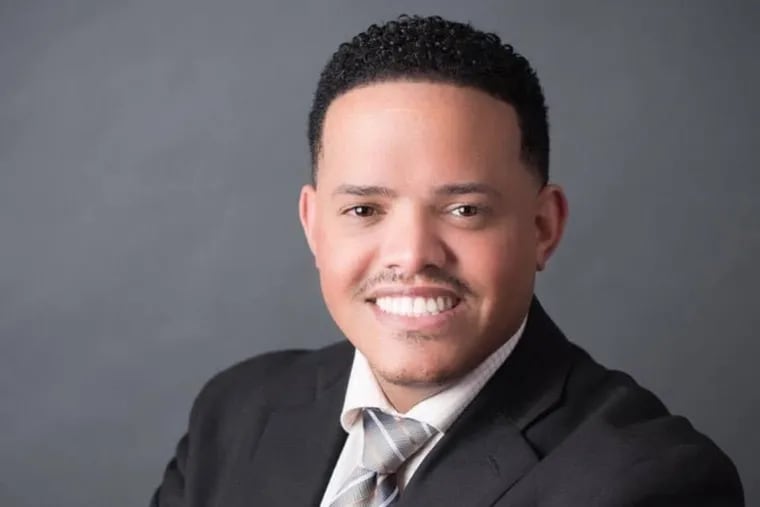Will naming the city’s first director of Latino engagement help us become less invisible? ¡Esperemos!
William Garcia's top order of business will be to educate and empower on behalf of the city’s 238,277 Latinos.

Even before people started sizing up the city government newbie whom Mayor Cherelle L. Parker tapped to be Philadelphia’s first director of Latino engagement, a strong case had already been made for hiring William Garcia.
In a press release announcing Parker’s latest appointments, Garcia, 41, was described as someone who had worked in Philly’s Latino community for two decades, mostly in his role at Esperanza Academy Charter School.
He was also described — and this is the part that got my attention — as “the son of Puerto Rican immigrants.”
Nope. Or as they say on the island: Nope.
I didn’t even need to talk to Garcia to know that he was absolutely not the son of Puerto Rican immigrants — because Puerto Ricans, the city’s largest segment of Latinos, are not immigrants but U.S. citizens. And, well, if a harried city spokesperson who knows better stumbled over a fact that nearly half of Americans also struggle with, then bienvenido, Mr. Garcia. You have your work cut out for you.
The particulars of the role are still a work in progress, Garcia told me during a brief phone conversation this week, but his top order of business will be to educate and empower on behalf of the city’s 238,277 Latinos. That includes fellow Puerto Ricans who — I repeat — are Americans who have been part of the fabric of Philadelphia for centuries.
Among his priorities, he said, is economic development with a focus on affordable housing. “A lot of our people are displaced or just currently renting. We would like to see them stay and build roots in the city.”
I was glad to hear that. Latinos, who make up 16% of Philly’s population, are the city’s poorest minority group: 38% of our community lives in poverty. And that figure includes those grappling daily with unemployment, gun violence, and unstable housing.
And yet, when it comes to holding positions that could help alleviate those realities, we remain severely underrepresented.
In 1984, Angel Ortiz became the first Latino elected to City Council, winning an at-large post. Back then, there was just one Latino lawmaker among Council’s 17 seats.
Forty years later, there’s still just one: Quetcy Lozada, who began representing the 7th District in 2022 when Maria Quiñones Sánchez, the first Latina elected to Council, resigned to become the city’s first-ever Latina mayoral candidate.
We have the power to change that. An Inquirer analysis of census data found that the city’s Latino population that is eligible to vote grew from 10.5% in 2010 to 13.1% in 2020. But we have to actually show up to be represented.
The median turnout in Democratic primaries in Philadelphia between 2015 and 2022 was a dismal 28% of registered voters. In Latino-majority precincts, it was 13%.
Part of the problem, of course, is the often monolithic approach to outreach that’s employed by city officials, even though the members of Philadelphia’s varied Latino community have a wide range of lived experiences, subtle linguistic differences, and immigration statuses.
Garcia acknowledged those challenges but was optimistic about how his new role could help.
The fact, he said, “that there is attention being brought to our community, and that this office now exists, it gives hope to the community that yes, we’re here, we’re heard, and we’re seen.”
And since we’re being heard and seen, he said, “Let’s make some noise.”
To inject the sacred prayer of the patron saint of Latinas of a certain age everywhere, Santa Jenny from the Block: “Let’s get loud!” And let’s understand that means unifying — really unifying — and ending decades of infighting among the Latino political class.
Look, the last thing this city needs is another taxpayer-financed office or position that doesn’t measurably make an impact on the lives of its residents. Anyone paying attention knows we have too many of those in Philly already.
» READ MORE: Puerto Ricans are U.S. citizens. This is a recording. | Helen Ubiñas
On that front, I was glad to hear Mayor Parker say that her administration will “measure the effectiveness” of these community engagement roles that also include a first-ever director of Muslim engagement.
“It won’t be enough for them to do the work and the people of Philadelphia not know the work that was done,” she said.
It won’t, and I’ll be watching.
It’s early, but I liked what I heard from Garcia, one of 10 kids who was raised in a rowhouse in Nicetown, and who promised me he’d join my seemingly endless mission to educate people that Puerto Ricans are U.S. citizens.
I like even more that he’s a newcomer to City Hall.
But I was most impressed by his apparent respect for the magnitude of his role. He clearly feels a sense of responsibility to deliver for the community.
“I see it as a challenge. I see it as necessary. And I see it as the perfect time for this to happen,” he said.
Here’s to hoping this Philadelphia born and bred Puerto Rican American embraces the pressure to help us leverage our collective potential into long-overdue transformational power.